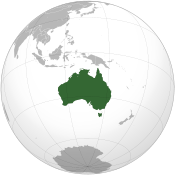David Hicks transferred from Guantanamo Bay to Australian prison
Sunday, May 20, 2007

Australian David Hicks, held for the past five years at the U.S. Guantanamo Bay detention camp in Cuba, was flown to Adelaide, South Australia Sunday on board an Australian government-chartered aircraft. Hicks is now in the custody of South Australian Correctional Services.
At a recent U.S. war crimes tribunal, Hicks pleaded guilty to providing material support to a listed terrorist organisation and was sentenced to seven years in prison. As part of the plea agreement, all but nine months of the sentence was suspended, which he will be allowed to serve out in an Australian prison.
"He [Hicks] has been transported to Yatala Labour Prison, where he will serve out his custodial sentence," said Alexander Downer, Foreign Minister and Philip Ruddock, Attorney-General in a joint press release. "Law enforcement and security agencies are working together to determine appropriate security arrangements. Consistent with longstanding practice, the Government does not intend to detail these measures, but the community should be assured that public safety is the primary concern."
His lawyer, David McLeod, told reporters: "David is well and he enjoyed the trip...He was very glad to be back on Australian soil."
Hicks was the first of hundreds of prisoners to be tried by the U.S. war crimes tribunal at the Guantanamo Bay detention camp in Cuba. Under the international transfer of prisoners scheme, Hicks was allowed to serve out the remaining time of his sentence in his home country. A contentious part of his sentence was a ban, or gag-order, placed on Hicks to prevent him from speaking with the media for a period of one year from the time he pleaded guilty, which was in March, 2007. It is unknown whether the U.S. gag-order could be legally enforced in Australia.
For the five years Hicks spent in detention at Guantanamo Bay, his family and some supporters in Australia had been lobbying the Australian government to secure the quick return of Hicks.

A small number of protesters waited outside the prison, with the media, for the arrival of Hicks. Some of the protesters were labeling Hicks a political prisoner and criticized the U.S. policy of holding people as unlawful combatants for so long without trial. "David Hicks is a political prisoner and it is just a complete human rights violation that our government can completely neglect one of its own citizens and leave him to rot in Guantanamo Bay," said Steve Patroni, one of the protesters.
At his trial, Hicks admitted he attended training camps in Afghanistan, conducted surveillance of the U.S. Embassy in Kabul and revealed that he had met Osama bin Laden, leader of Al-Qaeda. He had participated in fighting against the U.S. and its allies in Afghanistan in late 2001, and was caught while trying to flee the area.
Hicks is expected to be released from Australian prison by December, 2007.
Related news
- "Wikinews Shorts: May 20, 2007" — Wikinews, May 20, 2007
- "First Guantánamo Bay prisoner sentenced" — Wikinews, April 1, 2007
- "Guantanamo detainee David Hicks pleads guilty to providing "material support"" — Wikinews, March 27, 2007
Sources
- Dan Silkstone. "'Overjoyed' Hicks touches down" — The Age, May 20, 2007
- Press Release: "David Hicks is transferred to Australia under the International Transfer of Prisoner's Scheme" — Australia Department of Foreign Affairs and Trade, May 20, 2007
- Dan Silkstone. "David Hicks in custody" — Sydney Morning Herald, May 20, 2007
- Marie McInerney. "Guantanamo inmate returns to Australia" — Reuters, May 20, 2007
- AAP. "David Hicks back in Australia" — Herald Sun, May 20, 2007

